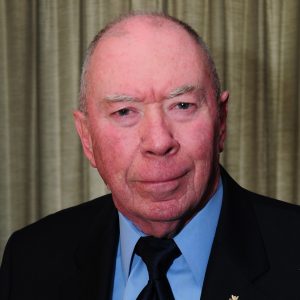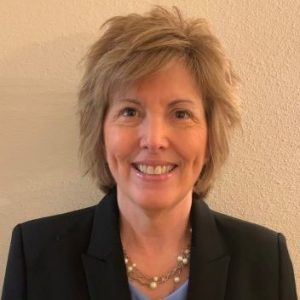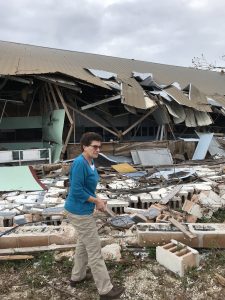What do police officers, firefighters, and insurance adjusters have in common? The answer: they are all witness to human tragedy. For adjusters, being on-scene of hurricanes and other catastrophes can impact their mental health and ability to perform their jobs.
Former Florida Deputy Insurance Commissioner Lisa Miller talks with a nationally-recognized expert on traumatic stress and with a veteran insurance claims team leader on strategies for recognizing and supporting distressed adjusters and the consequences of ignoring the problem.
Show Notes

Dr. Ray Shelton, Fellow and Director of Professional Development, The American Academy of Experts in Traumatic Stress
Ray Shelton, Ph.D. is a nationally-known expert on stress and the impacts it has on frontline personnel in disasters and other crises. He is a Fellow and the Director of Professional Development for The American Academy of Experts in Traumatic Stress, in Miller Place, New York. He’s seen tragedy first-hand over 35 years serving with the Nassau County, New York Police department, including the Twin Towers Collapse during 9/11. He’s also a former firefighter and paramedic.
“The adjusters are no different than fire, police, and EMS, they’re front line. They’re action-oriented. They take risks. They have tremendous attention to detail. They have a powerful need for control, to help people get their lives back in order,” said Shelton. “But the price that is paid for that, is all of the memories, all of the conversations, all of the sites that they see stays with them. There’s absolutely no delete button in the human brain.”
Shelton worked with the Liberty Mutual Insurance Catastrophe Response Team during the California Wildfires in 2008 and subsequent tornado outbreaks across the country. That’s where he met Jenny Pye, M.S., whose 35 years with Liberty Mutual included serving as a Property Claims Manager and Director of Quality Improvement for Auto Physical Damage (APD), Property, and Shared Services.

Jenny Pye, Director of Commercial Claims, Pilot Catastrophe Services
“Every time I hear Ray talk, it takes me back to early in my career when I was an adjuster in the field and would go out and have multiple fatality 18-Wheeler accidents, and just the emotions of being on scene and investigating a claim,” said Pye. “Sometimes the bodies were still there and then talking to their families, just all those emotions.”
Today, Pye is the Director of Commercial Claims at Pilot Catastrophe Services, based in Mobile, Alabama. She helps adjusters and the firms they serve to not only proficiently manage the technical part of the job, but manage the emotional toll that claims can have. She said adjusters who strive for great customer experience, often ignore or cover-up signs of traumatic stress.
“But sometimes you get feedback as a manager and hopefully before you get that feedback from your customer, you’re recognizing these issues,” said Pye. “Maybe the adjuster is not as responsive as they normally are. It’s not just answering a text or phone call, if you’re calling about a claim, it can be on a Zoom call and you will see where these folks that are normally engaged are not engaged.” That, she adds, requires claim managers to “finely tune your senses to be aware of what’s going on.”
Shelton, who presents “Fine Tuned Adjuster” webinars for the Property Loss & Research Bureau said there are consequences of not recognizing the signs in adjusters or of claims management not responding to the signs.
“If you do nothing, it stops productivity and the bigger danger (is) maybe that you lose that person who has bottled this all up from multiple times that this has occurred and finally says, ‘You know, I’ve had enough’ and they leave the industry,” Shelton said, noting the current market challenge of recruiting adjusters to replace those that leave the profession.
In his classes, Shelton uses techniques from his three books on the subject to help adjusters develop that sense of awareness in themselves so they can begin coping with the impacts of stress. Likewise, when team leaders see a change in an adjuster, that’s the time to act. The key, Shelton said, is to get the adjuster to simply talk about the claim.
“The easiest way to do that is to say to someone ‘Look, I wasn’t on that call or claim, it must have been really difficult. Tell me the story,’ Shelton advises. “Basically, just get them to start to talk because that leads them into saying other things that are maybe more personal, but at least we’ll talk about the impact that it’s having. The storytelling is such a valuable tool to opening the door to reach into someone, and it’s something that they’re comfortable with.” Asking them to talk about the claim, rather than about their feelings toward it, is a more subtle approach to get the adjuster to open up.

Host Lisa Miller looks at damage from Hurricane Michael in Panama City, Florida, October 2018
“It’s not an easy conversation to have,” adds Pye, who acknowledges that sometimes the team leader is not the person in the company who has the closest relationship with that individual adjuster. Finding the person who does, is key. “I’ve taken it to another person and asked ‘Are you seeing an issue? I know you have a closer relationship with this person, can you check on him?’ We all want to be everything to everybody as a leader, but we may not be the best person for that individual to connect with and feel comfortable engaging with,” Pye said.
Host Lisa Miller recently attended one of Dr. Shelton’s seminars with Pye to help in her work with field adjusters on disaster recovery insurance claims. “What Dr. Shelton and Jenny Pye are doing is very innovative, thought provoking, leaning-in kind of emotional support and awareness of what happens to our adjusters in the field,” Miller said. “While I won’t get on a roof, these men and women are the unsung heroes that help insurance companies help their customers on their worst day.”
Links and Resources Mentioned in this Episode
The American Academy of Experts in Traumatic Stress
Subscribe to the LMA Newsletter (free)
** The Listener Call-In Line for your recorded questions and comments to air in future episodes is 850-388-8002 or you may send email to [email protected] **
The Florida Insurance Roundup from Lisa Miller & Associates, brings you the latest developments in Property & Casualty, Healthcare, Workers’ Compensation, and Surplus Lines insurance from around the Sunshine State. Based in the state capital of Tallahassee, Lisa Miller & Associates provides its clients with focused, intelligent, and cost conscious solutions to their business development, government consulting, and public relations needs. On the web at www.LisaMillerAssociates.com or call 850-222-1041. Your questions, comments, and suggestions are welcome! Date of Recording 2/23/2024. Email via [email protected] Composer: www.TeleDirections.com © Copyright 2017-2024 Lisa Miller & Associates, All Rights Reserved


